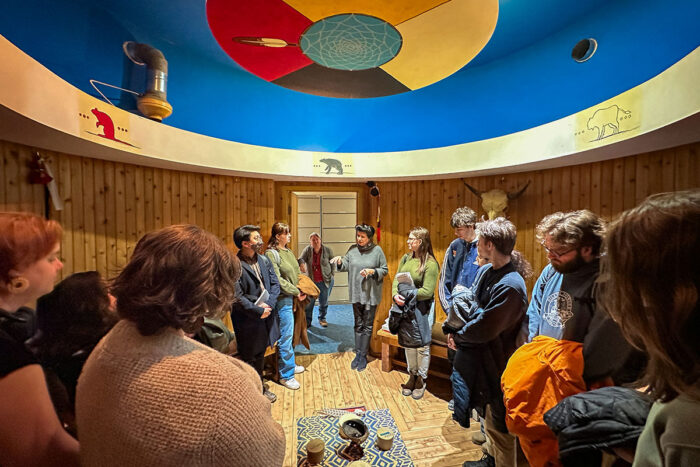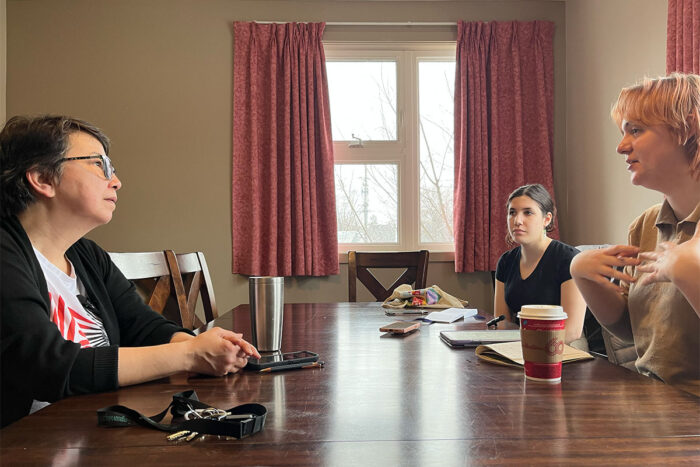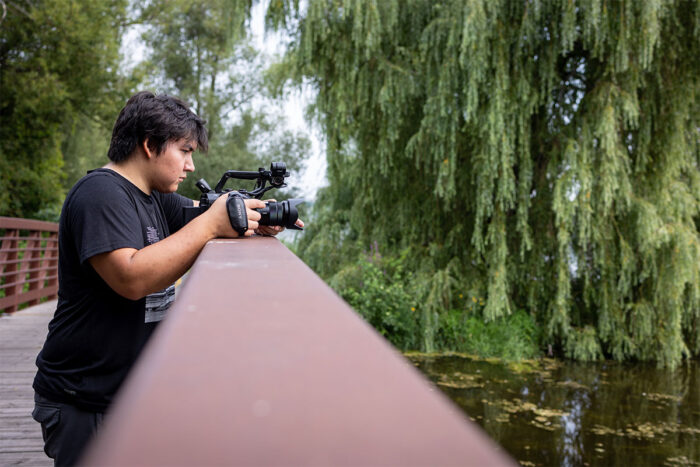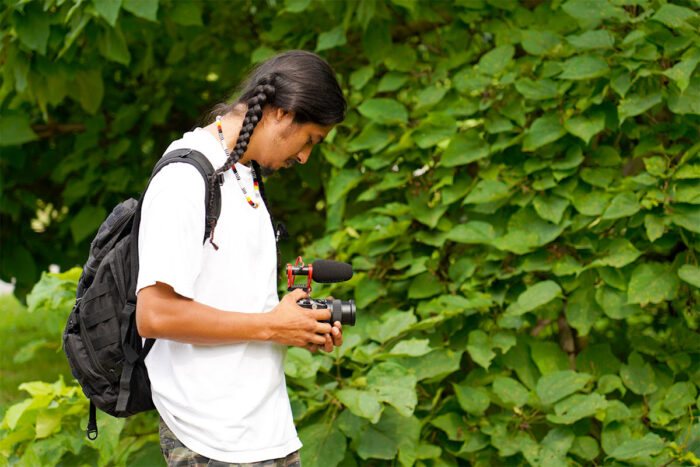Information and Admissions
The CJIIC is a 4.5 credit program that lasts 9 months.
The program is open to students who have completed an Ontario Secondary School Diploma (OSSD) or equivalent including a minimum of six 4U or M courses. Those credits must include a 4U course in English (or anglais) with a grade of 60 percent or higher.
Consideration will be extended to other applicants under Mature Applicant regulations (see the Mature Applicants section of the Undergraduate Calendar).
Admission to this program is restricted to Indigenous applicants. During the application process students will be required to verify their Indigenous Identity through the policy. Applicants will be provided with instructions about how to submit required documentation.
Admission is aimed at residents of Ontario. If you live outside of Ontario, we welcome your inquiry but cannot guarantee you a placement.
Hybrid Course Delivery
From September to May, you’ll take a mixture of online and in-person courses in the CJIIC.
Our online synchronous courses allow you to study journalism from your home community. We provide the technical gear, software, and textbooks you need to complete the program.
You’ll get lots of hands-on media training during our three in-person intensives, which will last approximately 7-8 days. The first intensive in September is held at Kenjgewin Teg in Manitoulin Island. The location of our second intensive during the winter term is still being determined. The last intensive in May is held at Carleton University in Ottawa.
Your food and accommodation costs during the intensives are covered. We also pay for your travel to attend the intensive courses.
Braided Learning
We make sure you have all the support you need as an Indigenous student to succeed in our program.
Our Student Success Facilitator is responsible for enhancing your academic success and your student experience. Whether you need help with a funding application, want an introduction on how to use Brightspace, or are interested in learning the basics of Word and Powerpoint to complete an assignment, we’ve got the support you need. They advise you with respect to academic progression and assist with you by acting as a liaison with faculty and support services in order to propose and implement solutions.
We also have a dedicated Cultural Advisor committed to preserving a way of life based on Indigenous values including spirituality, sacredness, reciprocity, social responsibility, and education. Our advisor helps us to integrate Indigenous cultural factors to protect your health and well-being.
A guiding philosophy of the CJIIC is that all courses will be designed with Indigenous pedagogical principles and delivered by experienced Indigenous journalists.
Land Acknowledgement – Free Tuition
In recognition that Carleton University is located on the unceded territory of the Algonquin Nation, we offer free tuition to one student annually from the Algonquins of Pikwàkanagàn First Nation and the Kitigan Zibi Anishinabeg First Nation.
To encourage local First Nation participation, we also offer free tuition to one student annually from the Mohawk Nation of Akwesasne.
Internships
During a two-week internship in a news or media organization, you’ll have an opportunity to apply what you learned in the classroom to the actual day-to-day work of reporting, writing, and producing news for an audience. Evaluations and student reflections round out the internship experience.
Our internship coordinator will assist you in finding a suitable placement. Your food and accommodation costs during the internship are covered. We also pay for your travel to attend your internship.
Graduation Incentives
The CJIIC follows the same tuition fee structure as the Bachelor of Journalism program at Carleton (More information about fees).
When you successfully complete the CJIIC, you’ll receive a $3,000 award to help you in the next steps of your journalism journey.
Plus, if you’re interested in more journalism training or an arts education, the CJIIC is a pathway to an undergraduate degree at Carleton University or other post-secondary institutions.
Transferring from CJIIC to the Bachelor of Journalism
Graduates from the Certificate in Journalism in Indigenous Communities are eligible for admission to the Bachelor of Journalism program at Carleton University with Advanced Standing. Normally, offers are made to students with an overall CGPA of 8.00 (B) or higher.
For additional Journalism program requirements and course descriptions check the Undergraduate Calendar.
Transferring from CJIIC to the Bachelor of Arts
Graduates from the Certificate in Journalism in Indigenous Communities are eligible for admission to the Bachelor of Arts at Carleton University with Advanced Standing or Carleton’s online Bachelor of Arts General Studies degree. Applicants must normally be Eligible to Continue in their year level, in addition to meeting the CGPA thresholds described in Section 3.1.9 of the Academic Regulations of the University.
For additional BA program requirements and course descriptions check the Undergraduate Calendar.
Interested? Take the next step!
Courses
JOUR1101 Indigenous Storytelling (0.5 credit)
Format – Online, biweekly classes
Storytelling is a traditional method used in Indigenous cultures to teach cultural beliefs, values, customs, history, and ways of life. In this course, storytelling will be the foundation for experiential/holistic learning and relationship-building. You’ll examine how Indigenous storytelling traditions intersects and contrasts with Western journalism practices.
JOUR1102 Foundations of Journalism (0.5 credit)
Format – Online, biweekly classes
This course introduces you to the context, concepts, issues and challenges in contemporary Canadian media that will shape your professional role as a practicing journalist. You’ll examine the state of the media, advocacy, social media and ethics, plus discuss Indigenous representation in the mainstream media.
JOUR1103 Fundamentals of Journalism (0.5 credit)
Format – Online, biweekly classes
Learn how to think and work like a journalist in this course. You’ll receive detailed feedback and mentoring from experienced journalist-instructors and teaching assistants. You’ll build skills in interviewing, writing, storytelling, editing and ethics while covering a wide scope of topics in your Indigenous community.
JOUR1104 Introduction to Audio Journalism (0.5 credit)
Format – In-person intensive
Radio is a popular media format in Indigenous communities. In this intensive workshop course, you will learn to pitch stories, report from the field, write conversationally, record voice and natural sound, edit audio files and produce compelling audio reports, radio newscasts and podcasts.
JOUR1105 Digital and Photojournalism (0.5 credit)
Format – Online, biweekly classes
Further development of your digital journalism skills. Students will receive instruction in online reporting and publishing, as well as learn the fundamentals of news storytelling through smartphone photography, including how to find visually newsworthy stories and the ethics of photojournalism in Indigenous settings.
JOUR1106 Entrepreneurial Journalism (0.5 credit)
Format – Online, biweekly classes
Beginning with a freelancer’s toolkit, you’ll learn to compete in a workforce that increasingly values an entrepreneurial mindset. You’ll be trained to find and sell real stories and grow your brand. You’ll explore innovative ways to reach audiences and fund your career as a media professional.
JOUR1107 Internships (1.0 credit)
Format – In-person intensive
During a two-week internship in a news or media organization, you’ll have an opportunity to apply what you learned in the classroom to the actual day-to-day work of reporting, writing, and producing news for an audience. Evaluations and student reflections round out the internship experience.
JOUR1108 Introduction to Video Journalism (0.5 credit)
Format – In-person intensive
Pictures are powerful – and this is where you’ll learn how to handle them. As you master visual literacy skills, you’ll report, shoot and edit video stories. You’ll work “live” in studio and from the field, producing a range of material using smartphones and DSLR cameras.







